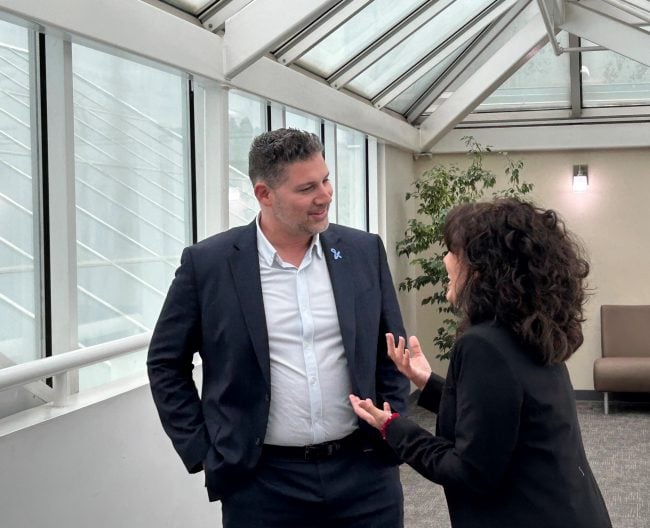LAS VEGAS – In a sobering and oftentimes gloomy message, an MITprofessor of management has told credit unions already witnessingshrinking margins and a spate of mergers, they also suffer weakgovernance and poor product penetration, all factors harboringeconomic trouble in the future. In a closing day speech at theannual NACUSO conference May 18, Glen L. Urban, a faculty memberand former dean at the MIT Sloan School of Management in Cambridge,Mass., said the tepid growth in members and market share coupledwith the daily loss of CUs underscore industry difficulties.“Losing credit unions is certainly not a good thing,” declaredUrban who presented to the NACUSO audience a list of industryweaknesses ranging from a general slowness by CU management toadapt to change to a lack of depth and experience in CU boardsallowing banks and other competitors to move ahead. Moreover, whilethere are exceptions, a large number of CUs lack the resources andthe agility to undertake thorough segmentation strategies or meetthe Internet needs of baby boomers or members of generation X forproducts and services, said Urban, who also is co-director of MIT'sCenter for e-Business. Young people, he argued, “simply don't thinkof a credit union as the place to go for financial wealth” muchless for mortgages. Industry statistics speak volumes, he said, ofthe slow pace of CU penetration, citing 6.5% of U.S. deposits, 2%of mortgages and 3.4% of checking accounts. Conditions are notcompletely negative, however, observed Urban noting that CUs havemany strengths and opportunities, he said, listing an aggressivebranch strategy and the industry's revered role as trusted“advocate” for their members. Banks are way behind CUs in thatarea, he said, based on data compiled by firms like ForresterResearch. (See related story on page 1.) Still “business as usual”for CUs will lead to stagnation and decline as innovativecompetitors seize the market. A key, however, to overcomingindustry weaknesses may be in greater collaboration, a point whichwas a theme at the NACUSO conference and which Urban himself hasplayed a pivotal role in advising some large CUs on ways to expandproduct lines and reach new audiences. Urban is co-founder andchairman of Experion Systems, a Maynard, Mass. firm with a CUclient list of 24 CUs all of whom are subscribers to a “trustedadvisor” line of automated advice products aimed at frontlinebranch personnel and call center staffers. Since the CU debut oftrusted advisor three years ago, the company had hoped to interesta larger number of CUs in the Internet-linked, advisor suite ofproducts but “the tight margins have played a factor in creditunions putting off making the purchase,” Urban said. “We are stillvery loyal to credit unions and they are our core market,”emphasized Urban noting, however, that a vast number of CUs arestill way behind in making skilled use of the Internet and Webservices. In his NACUSO talk, Urban took note of inherent problemsof CU boards and fears of many CEOs to push through advancedtechnology because of board concerns. Pointing to the former CEO ofCitibank, Urban said, “I don't think you would see Sandy Weillhaving this kind of problem” in getting clearance for new productswhich he deemed necessary to compete. CEOs in CUs lack the clout oftheir counterparts in banks, while some CU boards which hedescribed as “quite conservative” also lack those key individualsfrom the industry who can provide real knowledge, input andparticipation in helping guide the CU. The CU board may be filledwith well-minded employees from sponsor companies, but they bringlittle in hard-nosed experience vitally needed by the CU. Whileurging caution, Urban also suggested CUs pay closer attention tobloggers and the Internet market to ensure CUs reach the babyboomers and generation Xers with products they need. The fact is,he said, many non-banks continue to make Internet strides pushingmortgages, auto loans, credit cards and other products. He pointedto Fidelity Investments, H&R Block, Charles Schwab and MetLife, as examples of firms which are gaining the loyalty ofcustomers who might ordinarily go to CUs. If that weren't enough,then there are the many new Internet banking firms like LendingTreeand ING that CUs have to contend with, he said. Even CU branchexpansion, while a definite positive with 2,000 facilities in fouryears, pales in comparison to the explosion of new bank branches,he said. It was noted that Citibank, as one institution, has 1,400branches plus 3,500 ATMs worldwide. “I do see some glum faces,”said Urban as he made his remarks to an audience that was payingclose attention and taking notes.
|Later Urban said he meant his speech to be “well balanced” inshowing both strengths and weaknesses of CUs.
|In citing CU advances, the MIT professor noted onlineinnovations handled by CUs like First Tech CU in Beaverton, Ore.and its ability to penetrate a large base of its members throughthe “trusted advisor” program offered by Experion, Urban'sfirm.
|Come this fall, he said First Tech is considering applying“trusted advisor” to help out its Medicare-eligible members onhealth care decision-making when plans come up for renewal. -
|Complete your profile to continue reading and get FREE access to CUTimes.com, part of your ALM digital membership.
Your access to unlimited CUTimes.com content isn’t changing.
Once you are an ALM digital member, you’ll receive:
- Critical CUTimes.com information including comprehensive product and service provider listings via the Marketplace Directory, CU Careers, resources from industry leaders, webcasts, and breaking news, analysis and more with our informative Newsletters.
- Exclusive discounts on ALM and CU Times events.
- Access to other award-winning ALM websites including Law.com and GlobeSt.com.
Already have an account? Sign In
© 2024 ALM Global, LLC, All Rights Reserved. Request academic re-use from www.copyright.com. All other uses, submit a request to [email protected]. For more information visit Asset & Logo Licensing.









